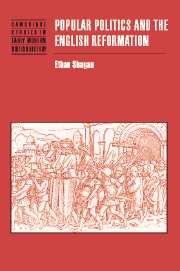Book contents
- Frontmatter
- Contents
- Acknowledgements
- List of abbreviations
- Note on the text
- Introduction
- Part I The break with Rome and the crisis of conservatism
- 1 ‘Schismatics be now plain heretics’: debating the royal supremacy over the Church of England
- 2 The anatomy of opposition in early Reformation England: the case of Elizabeth Barton, the holy maid of Kent
- 3 Politics and the Pilgrimage of Grace revisited
- Part II Points of contact: the Henrician Reformation and the English people
- Part III Sites of Reformation: collaboration and popular politics under Edward VI
- Conclusion
- Bibliography
- Index
- Cambridge Studies in Early Modern British History
1 - ‘Schismatics be now plain heretics’: debating the royal supremacy over the Church of England
Published online by Cambridge University Press: 05 July 2009
- Frontmatter
- Contents
- Acknowledgements
- List of abbreviations
- Note on the text
- Introduction
- Part I The break with Rome and the crisis of conservatism
- 1 ‘Schismatics be now plain heretics’: debating the royal supremacy over the Church of England
- 2 The anatomy of opposition in early Reformation England: the case of Elizabeth Barton, the holy maid of Kent
- 3 Politics and the Pilgrimage of Grace revisited
- Part II Points of contact: the Henrician Reformation and the English people
- Part III Sites of Reformation: collaboration and popular politics under Edward VI
- Conclusion
- Bibliography
- Index
- Cambridge Studies in Early Modern British History
Summary
The centrepiece and actualising principle of the English Reformation was not a theological doctrine, like Luther's justification by faith alone, but an act of state: in November 1534, after years of extorting concessions from parliaments and clerical convocations, Henry VIII was endowed with the authority of ‘supreme head of the Church of England’. This was far more than a mere ratification of the annulment of the king's marriage to Catherine of Aragon, the ostensible purpose for which he had challenged papal authority; it was a fundamental restructuring of power within the realm. For centuries, two governments, one royal and one ecclesiastical, had laid their overlapping claims to jurisdiction and sovereignty across the English polity. Two court systems had settled disputes, two tax systems had demanded revenues, and two rudimentary bureaucracies had maintained order. Now in a remarkable coup d'état the head of the Church government was overthrown, his legal authority eliminated, his political power outlawed, and his subordinates brought under the jurisdiction of the king of England.
One ironic result of this heavily politicised context is that, despite the significance of the royal supremacy for such diverse subjects as economic history, legal history and even the origins of the British Empire, one area in which its importance is not altogether clear is the study of religion. Earlier generations of scholars saw the overthrow of papal authority as promoting and enabling the concomitant growth of English Protestantism.
- Type
- Chapter
- Information
- Popular Politics and the English Reformation , pp. 29 - 60Publisher: Cambridge University PressPrint publication year: 2002



